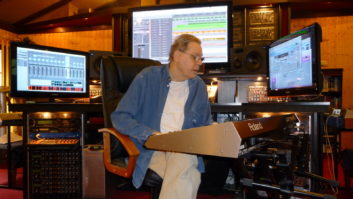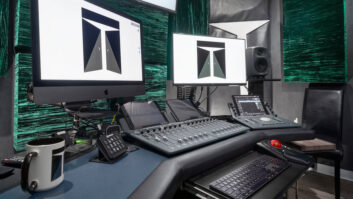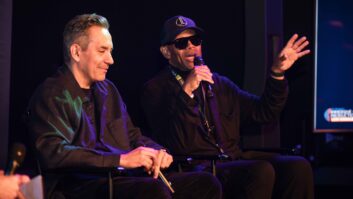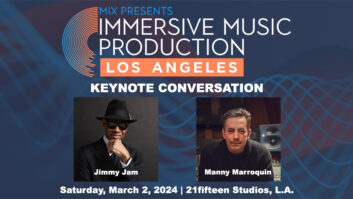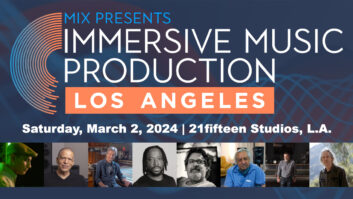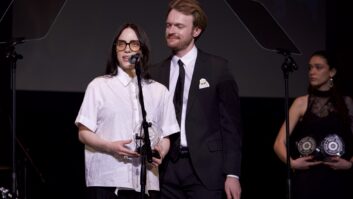From a music business perspective, 18-year old Declan McKenna has already achieved much more than most aspiring professional musicians can ever hope for in a career.
He has already performed at major international music festivals such as Lollapolooza, SXSW and Glastonbury (twice), and two years ago, following the success of his stellar breakout single, “Brazil,” was the subject of a record label feeding frenzy—garnering offers from no less than 40 record labels. McKenna ultimately decided to sign with Columbia Records, and his debut album, What Do You Think About The Car?, survives all the hype, exhibiting a depth of songwriting ability that belies his age. Pro Sound News caught up with McKenna on the final leg of his U.S. tour.
ON BREAKING OUT:
Two-and-a-half years ago, in December 2014, I put ‘Brazil’ out and it was kind of floating around the Internet for a few months. And then there was Glastonbury Festival’s Emerging Talent Competition in 2015, and I think as a result of the application process, a bunch of industry types reached out to me and things started to happen. Then I just eased my way into performing and then going into professional studios, which is very different from being sort of DIY and bedroom recording. I feel like I have learned a lot over the last couple of years in terms of my songwriting. Having completed this album, I feel like I can start from scratch on something else and start something new over the next couple of years. I am excited to make another album now that I am a bit more experienced and focused.
ON PICKING TUNES:
It wasn’t really until the back end of last year, and not too long after we finished recording them album, that I had the final group of songs together. I hadn’t even worked out a track listing yet. It was a very long process and there was such a big distance in time between the first batch I had written and other new songs that were more recent. Once we had all of these together was when the record finally came together and I felt like I had a collection of songs that were pretty good, all encompassing the last couple of years. Some songs, such as “Mind”, changed a lot over the process. This started out as an almost Belle and Sebastian-type rock ballad, slower and acoustic. But when it was finished, it turned out a lot more powerful and heavy—it was completely different compared to how I had recorded it earlier.
ON WORKING WITH JAMES FORD:
The majority of the album was recorded in London in various studios. James Ford [Arctic Monkeys, Foal] produced most of the album, and the work with him was done between February and December of last year. Our work in the studio was a long period of recording that was staggered from all the touring we were doing. Before creating the album, I didn’t really have a specific idea of the sound that I wanted. There was a lot of experimentation involved bringing the songs from home and then into the studio. A couple of tracks, especially the ones I did with James, really set out to define the sound of the record. And once we found that sound, it really helped the rest of the tracks along. My goal all along was always to collaborate and improve things where I could.
ON BEING “HUMONGOUS”:
My favorite tracks are the most recent ones. In particular, “Humongous” is the most recent one I’ve recorded on the album. Most of the rest of the album was written when I was 16, and that song, since it was written more recently, feels like who I am now. It is an honest tune and says more about the direction I want to head in. We had a day or two in the studio where we could play that song and figure out what key we wanted to have it in. For the vocals, the main thing we struggled with was to find the sweet spot for the softness in the verses. On that song, between the verses and the choruses, we took it up a couple of notches and then took it back down. Once we figured out the balance for that, it really made everything more powerful and the rest of it developed naturally.
ON TOOLS OF THE TRADE:
A lot of my writing at the moment is being done on the laptop—since I am touring more, I’ve had to train myself to write using a more electronic approach. But I do really like to write with just an acoustic guitar. While I am on tour, I don’t do much of my writing on either an acoustic guitar or a piano—but songs like “Humongous,” “Why Do You Feel So Down” and “Listen To Your Friends” came to me using a basic acoustic and building a song around that. The demos for these particular songs were done at the end of last year in my house, where I recorded directly into Logic. At that point, I just had an acoustic guitar, bass, and electric piano and then I would program the drums and that was all there was, so I could figure out what was going to happen to the song.
ON REACHING THE FINISH LINE:
For me, this album kind of documents the time that has passed between writing and recording over the last three or four years. When I finally finished recording the album, it was really satisfying—especially having completed all these songs that I had written two years ago. It was a relief knowing that it was finally going to come out and that I could work on something else with a fresh mind and fresh ideas.
Jacques Sonyieux is a devout explorer of recording studios and the artists that occasionally inhabit them. Please send any tips or feedback to Jacques at: [email protected].
